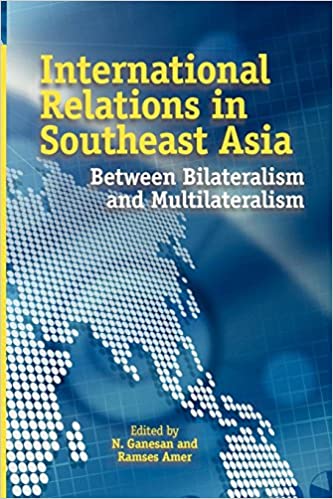
Edited by Narayanan Ganesan and Ramses Amer (Institute of Southeast Asian Studies, 2010)
International Relations in Southeast Asia: Between Bilateralism and Multilateralism is the publication arising from the project “Bilateralism versus Multilateralism in Southeast Asia” funded by the Hiroshima Peace Institute. A total of two workshops were held as part of the project, the first in Hiroshima in December 2007 and the second in Kuala Lumpur, Malaysia in October 2008. This book explores the dynamic nature of international relations in Southeast Asia with a view to identifying important and difficult issues between states in the region. It is also aimed at discerning whether states prefer to utilize bilateral or multilateral channels in the resolution of difficult issues.
The book begins by examining the theoretical issues related to bilateralism and multilateralism in international relations in general and the evolution of multilateralism in the Association of Southeast Asian Nations (ASEAN). Following that, there are nine case studies that examine the most important bilateral relationships in the region. The major finding from the research is that Southeast Asian states generally prefer difficult and contentious issues to be resolved bilaterally in order to prevent the issues from escalating out of control. This appears to be the time-tested and preferred practice though multilateral channels are often used as well.
東南アジアの国際関係――二国間関係と多国間関係
ナラヤナン・ガネサン、ラムゼス・アメール/編(東南アジア研究所、2010年)
本書は広島平和研究所のプロジェクト研究「東南アジアにおける二国間主義と多国間主義」の成果である。同プロジェクトの期間中、2007年12月に広島、2008年10月にクアラルンプールで計2回のワークショップを開催した。本書においては、この地域における国家間の複雑かつ重要な事例を明確化するために、東南アジアの国際関係の動的側面を探った。更にこのような難問解決に際し、各国家が二国間協議、あるいは多国間協議のどちらを優先するのかという点にも着目した。
本書はまず、国際関係における一般的な二国間主義・多国間主義の理論的課題を検証し、ASEAN(東南アジア諸国連合)における多国間主義の進展について掘り下げ、続いて、この地域における最も重要な二国間関係の事例9件を検証した。これらにより明らかになった事は、一般的に東南アジア諸国では議論の分かれる難題については、事態が制御不能となることを避けるため、二国間での解決を優先しているということである。しばしば多国間協議による解決もなされるが、長年実績のある二国間による解決が優先される傾向にある。
